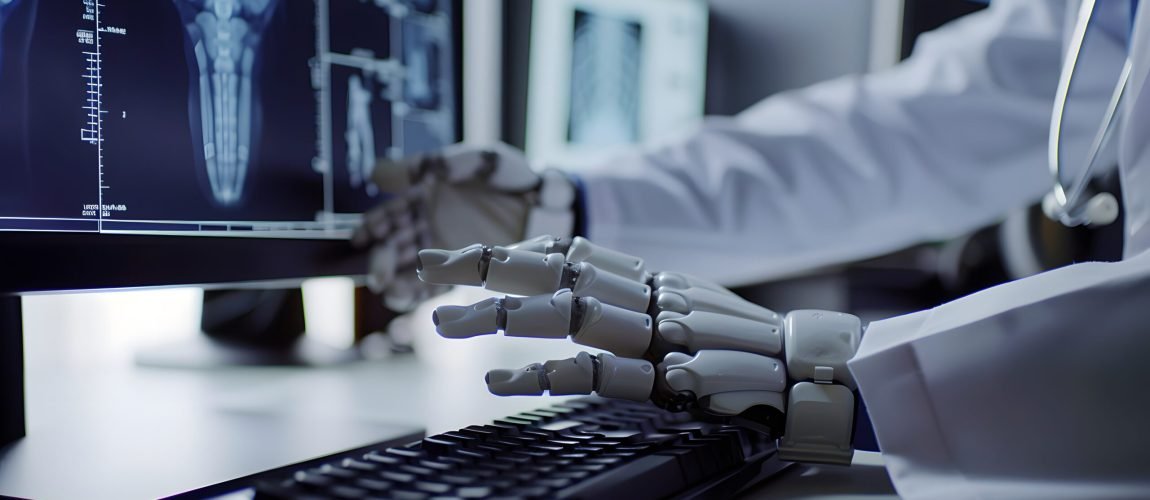Artificial Intelligence (AI) is making significant strides across various industries, and healthcare is no exception. In 2024, AI is revolutionizing how medical professionals diagnose, treat, and manage patient care. As we look ahead to 2025, the pace of change is expected to accelerate, transforming healthcare into a more efficient, precise, and personalized field. In this blog post, we’ll explore the current state of AI in healthcare and predict its advancements in the coming year.
AI in Healthcare in 2024 – A Snapshot
In 2024, AI is already embedded in various healthcare aspects, helping patients and providers. Key areas where AI is making a substantial impact include
Precision Medicine
AI algorithms are increasingly used to tailor treatment plans based on individual genetic makeup, lifestyle, and environmental factors. By analyzing vast amounts of data, AI can identify the most effective treatments for patients, reducing trial-and-error methods and improving outcomes. Integrating AI with genomics and pharmacogenomics allows for a deeper understanding of disease mechanisms and enables more precise drug development.
Diagnostics and Imaging
AI-powered diagnostic tools, particularly in medical imaging, enhance the speed and accuracy of diagnoses. AI models trained on millions of medical images can detect anomalies like tumors, fractures, and infections faster and with greater accuracy than traditional methods. AI is also playing a crucial role in radiology, dermatology, and pathology, where it assists clinicians in analyzing images, interpreting lab results, and providing early detection of conditions like cancer, heart disease, and neurological disorders.
Clinical Decision Support Systems (CDSS)
AI-driven Clinical Decision Support Systems are helping doctors make evidence-based decisions more efficiently. These systems analyze patient data and suggest possible diagnoses or treatment options, based on a database of clinical knowledge and real-time data. AI tools are designed to support healthcare professionals rather than replace them, reducing human error and improving patient care.
Predictive Analytics for Healthcare
Predictive analytics powered by AI is being used to predict patient outcomes, such as the likelihood of developing chronic conditions like diabetes or heart disease. By identifying risk factors and recognizing patterns, AI can help with early intervention strategies, reducing hospital admissions and improving long-term health outcomes. Additionally, AI models are aiding in population health management by identifying trends and enabling targeted public health initiatives.
Drug Discovery and Development
AI is accelerating the drug discovery process by predicting how different compounds interact with the human body. Machine learning models can analyze chemical structures and predict which compounds may lead to successful drugs. This has resulted in faster development times and reduced costs for bringing new medications to market. AI is also enabling the creation of more effective personalized treatments based on individual patients’ genetic profiles.
How AI Will Transform Healthcare in the Future
Looking ahead to 2025, AI will continue to evolve and enhance healthcare practices in new and exciting ways. Here are some key areas where AI will have an even greater impact
Autonomous Medical Systems
By 2025, AI will be capable of powering autonomous medical systems that can perform complex tasks with little to no human intervention. For example, robotic surgery systems will become more advanced, utilizing AI to perform precise, minimally invasive procedures. These systems will be able to analyze real-time data during surgery and make adjustments as needed, improving outcomes and reducing recovery times.
AI-Driven Virtual Health Assistants
In 2025, AI-powered virtual health assistants will become more prevalent in everyday healthcare. These virtual assistants will provide real-time health advice, answer questions about symptoms, and help patients track their wellness goals. With advancements in natural language processing and machine learning, these assistants will become more sophisticated and capable of managing routine health inquiries, appointment scheduling, and medication reminders.
Integration of AI with Wearables
Wearable technology, like fitness trackers, smartwatches, and health monitoring devices, will be more integrated with AI by 2025. AI algorithms will analyze data from these devices in real time, providing patients and doctors with actionable insights about their health. For example, AI can predict potential health issues, such as a heart attack or stroke, before symptoms even appear, allowing for proactive care and reducing emergency situations.
Advanced AI in Mental Health
Mental health care is an area where AI’s potential is just beginning to be explored. By 2025, AI could provide real-time mental health assessments, help identify early signs of mental illness, and recommend personalized treatment options. Machine learning algorithms could help therapists by analyzing patient conversations or behavior patterns to identify triggers and optimize treatment plans. Virtual mental health counselors powered by AI could also provide support for those who have limited access to in-person therapy.
AI in Population Health and Public Health Initiatives
As AI models become more advanced, they will be able to predict health trends on a population level with greater accuracy. Public health organizations will be able to identify emerging diseases, outbreaks, and trends faster, allowing for more effective responses. AI could also help identify areas with healthcare disparities, leading to more equitable healthcare interventions and resource allocation.
AI-Powered Clinical Trials
AI will drastically change how clinical trials are conducted. By 2025, AI will be able to analyze patient data more efficiently to identify suitable candidates for clinical trials, reducing recruitment time and costs. Additionally, AI algorithms can continuously monitor trials, identify potential risks, and provide insights into the efficacy of treatments, accelerating the development of new therapies.
Challenges and Considerations
As AI continues to shape healthcare, there are still significant challenges to address. Data privacy and security will remain a concern as AI relies on vast amounts of patient data. Ensuring that AI systems are transparent, ethical, and free from bias will be crucial for building trust with both healthcare professionals and patients. Moreover, while AI is poised to improve efficiency and outcomes, it is important to strike the right balance between human expertise and machine intelligence. AI will continue to assist and augment human decision-making but should never replace the critical role that healthcare professionals play in patient care.
AI is already transforming healthcare in 2024, and its impact is expected to grow exponentially by 2025 and in future years. From personalized medicine and diagnostic tools to autonomous medical systems and advanced mental health care, AI is reshaping how we approach healthcare on a global scale. While there are challenges to overcome, the future of AI in healthcare holds incredible promise, improving outcomes for patients and creating a more efficient, responsive healthcare system for everyone. As AI technology continues to evolve, we can expect healthcare to become more patient-centered, data-driven, and accessible than ever before.
Are you looking to integrate AI technology into your healthcare workflows? Contact us today to discover how we can help improve patient care, enhance operational efficiency, and drive innovation in healthcare through AI-driven solutions.











